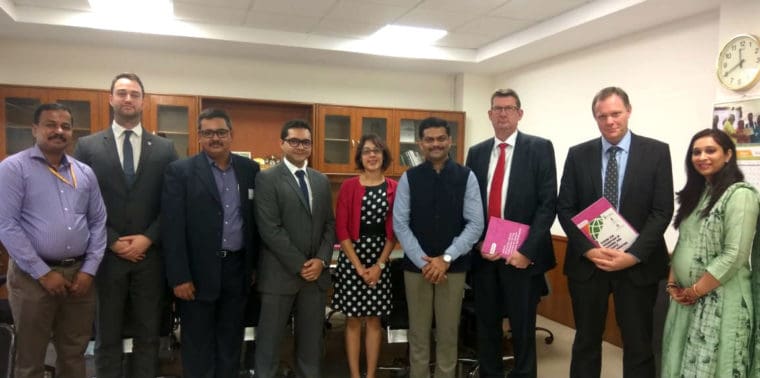UKIBC Press Release – ‘Beyond the Top 200’ Report Launch and Higher Education Delegation to India
The UK India Business Council launches it's new report 'Beyond the Top 200' during delegation of leading UK Higher Education institutions to India.

A new UK India Business Council report, ‘Beyond the Top 200’, sets out how India’s new higher education policy could accelerate India’s rise to superpower status by enabling young Indians to receive the world’s best higher education in India through greater availability of the top courses provided globally.
UKIBC’s ‘Beyond the Top 200’ Report:
The report, launched in the margins of the FICCI Higher Education Summit, advocates for effective international collaboration in Indian Higher Education. On the path to becoming a 21st global superpower, India will need is rightly placing excellence, equal access, and employability at the heart of expanding its Higher Education system.
As the report highlights, UK Higher Education institutions can, and want, to play an important role in supporting this goal at every level.
To meet this challenge, Richard Heald, UKIBC Chief Executive, said
“We are highly encouraged that the Government of India is creating policy to allow foreign universities to operate in the country. This is a welcome step that would allow the best courses, teaching, and facilities available globally to directly change lives in India. However, there is consideration being given by the Committee developing India’s new policy to allow only the top 200 globally ranked universities to participate with the best Indian institutions. We think this will limit the supply of genuinely top-quality learning opportunities for Indians.”
Building on Heald’s comments, Tara Panjwani, UKIBC’s Head of Higher Education, said that:
“to truly unlock the potential of India’s young population, a more flexible approach is needed. Our report therefore recommends that all institutions, whether Indian or foreign, public or private, and irrespective of ranking, be permitted to forge international partnerships should it demonstrate, to both parties, real added value. Only this way can international collaboration meet the demand of India’s students, institutions, and employers.”
Following the launch event and an interaction with the MHRD, the UKIBC delegates are confident and positive about the Indian Higher education environment and are encouraged by initiatives such as SPARC and GIAN, which will strengthen UK India Higher Education Relations. Indeed, one of the delegates, Lewis McKinnon from the University of London, stated that he is:
“confident that discussions with the MHRD has shown the commitment from UK HE institutions to contribute to India’s success and to work toward creating a favourable environment for all to work in… to ensure a prosperous future between India and the UK”.
The full report ‘Beyond the Top 200 – Effective International Collaboration for Indian Higher Education’ can be found here: www.ukibc.com/reports/beyondthetop200
UKIBC’s Higher Education Delegation
The report was launched in the midst of UKIBC’s bespoke delegation of seven leading UK Higher Education institutions to Delhi and Mumbai exploring future collaboration in the sector between our two countries.
During the five-day visit, delegates attended the FICCI Higher Education Summit, and interacted with all the key stakeholders in India’s HE ecosystem – policy makers, HE institutions, employers, and students.
The delegation comprised of representatives from the Universities of London, Birmingham, Essex, East Anglia, Cardiff, Surrey, and the Eurocentres Language Schools Network.
Two of the UKIBC delegates addressed the FICCI Summit. Dr Daniel Rycroft (Chair of the India Dialogue, School of World Art Studies at the University of East Anglia) spoke on the need for global knowledge, and Professor Vincent Emery (Senior Vice-President of the University of Surrey) on Universities 4.0.
Professor Emery shared with us that:
“India remains a high priority country for academic partnerships and being able to participate in this UKIBC delegation and the FICCI higher education summit provides a great catalyst to expand existing links and provide new opportunities to build sustainable university networks for the future.”
The Delegation looks forward to meeting the next stage of their visit in Mumbai where they will meet the new Vice-Chancellor of the University of Mumbai, Dr Suhas Pednekar, followed by a series of bespoke roundtables with Students and Indian businesses.
Tara Panjwani (UKIBC Head of Education, Policy and Research), organiser of the Delegation, stated that
“I’m thrilled that this delegation has gone so well. There was a diverse programme, including government engagement, speaking at the prestigious FICCI summit, and the launch of our next thought leadership report. The visit was about exploring partnerships with Indian institutions to facilitate a deeper, long-lasting, engagement between UK and Indian higher education stakeholders. And partnerships with employers in India to ensure that the UK HE system can help provide the talent that is so essential for India’s growth. Not least, we also engaged with young Indians and we were blown away by the sheer scale of their ambition, determination and energy.”
For daily updates on the Delegation’s progress, visit our dedicated blog here: www.ukibc.com/higher-education-delegation-2018
About the UKIBC
The UK India Business Council (UKIBC) is the premier membership-led organisation supporting the promotion of trade, business and investment between the two countries. UKIBC plays an influential role in creating and sustaining an environment in which free-trade and investment flourishes. Through its insights, networks, policy advocacy, services and facilities, the UK India Business Council supports UK businesses to achieve success. Find out more by visiting www.ukibc.com and following @UKIBC on Twitter.







